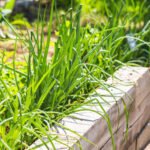Deer can wreak havoc on a carefully-tended vegetable garden, leaving behind destruction in their wake. In order to protect your hard work and ensure a bountiful harvest, it’s essential to implement effective deer repellent strategies. Understanding the impact of deer on vegetable gardens is the first step in safeguarding your crops and preserving your garden’s integrity.
The mere presence of deer can have a detrimental effect on vegetable gardens, as these animals are known to consume a wide variety of plants. From tender young shoots to mature vegetables, deer are indiscriminate feeders that can quickly decimate an entire garden if left unchecked. To prevent such damage, it’s crucial to proactively address the likelihood of deer encounters and take measures to deter them from entering your garden space.
In this article, we will explore the signs of deer presence in your vegetable garden, common methods of deer repellent, natural options for organic gardens, DIY recipes and methods for creating your own repellents, the importance of maintaining a consistent strategy, utilizing physical barriers, and tips for choosing the best repellent for your specific needs. By understanding these factors and implementing effective strategies, you can protect your vegetable garden from deer damage and ensure a successful growing season.
Identifying the Signs of Deer Presence in Your Vegetable Garden
One of the first steps in effectively implementing a deer repellent strategy for your vegetable garden is to identify the signs of deer presence. Whether you live in a rural area or a suburban neighborhood, deer can often find their way into gardens in search of food.
Common signs of deer presence in your vegetable garden include visible hoof prints or tracks, as well as browsing damage on plants. Deer are known to feed on a variety of vegetables and can cause significant damage if left unchecked.
In addition to physical evidence, there are also behavioral indicators that can help you determine if deer have been visiting your garden. Look for evidence of browsing, such as broken or nibbled plants, as well as droppings around the perimeter of your garden. If you notice any of these signs, it’s likely that deer have been present and may continue to return unless preventative measures are put in place.
To effectively protect your vegetable garden from deer damage, it’s essential to understand the signs of their presence and take action before significant harm is done. Utilizing a quality deer repellent for vegetable gardens is one way to deter these animals from feeding on your crops. By being proactive and implementing an effective strategy, you can minimize the impact of deer on your vegetable garden and enjoy a successful growing season without unwanted visitors causing damage.
Common Methods of Deer Repellent for Vegetable Gardens
Deer can be a significant threat to vegetable gardens, causing damage and destruction to carefully cultivated plants. It is crucial for gardeners to understand the various methods of deer repellent in order to protect their vegetable crops.
Common methods of deer repellent for vegetable gardens include:
- Fencing: Installing a tall and sturdy fence around the perimeter of the vegetable garden is one of the most effective ways to keep deer out. The fence should be at least 8 feet tall to prevent deer from jumping over it.
- Commercial Repellents: There are numerous commercially available deer repellent sprays and granules that can be applied directly to plants. These products often contain strong-smelling or bitter-tasting ingredients that deter deer from feeding on the vegetables.
- Ultrasonic Devices: Some gardeners opt to use ultrasonic devices that emit high-frequency sounds, which are unpleasant for deer but inaudible to humans. These devices can help keep deer away from the garden area.
Additionally, it’s important for gardeners to rotate between different types of repellents to prevent deer from becoming accustomed to any one method. For example, alternating between using a commercial spray and then switching to an ultrasonic device can help maintain effectiveness.
In addition, proper application and reapplication of these deterrents as directed is crucial for their success in keeping deer away from vegetable gardens. Without consistent use, these repellent methods may become less effective over time as deer grow accustomed to them. It’s also essential for gardeners to monitor the effectiveness of their chosen method and make adjustments as necessary.
Natural Deer Repellent Options for Organic Vegetable Gardens
When it comes to protecting your organic vegetable garden from deer, it’s essential to consider natural deer repellent options. These methods not only deter deer effectively but also align with the principles of organic gardening. One of the most popular natural deer repellents is using strong-smelling plants and herbs such as lavender, mint, or garlic.
Deer dislike these odors and will often avoid areas where these plants are present. Additionally, creating a border of these plants around your vegetable garden can act as a natural barrier against deer.
Another effective natural deer repellent is applying homemade or store-bought sprays made from ingredients like hot peppers, eggs, or rotten eggs. These concoctions emit an odor that repels deer without causing harm to them or the environment. Furthermore, installing motion-activated sprinklers in your organic vegetable garden can startle and deter deer from entering the area.
It’s important to keep in mind that while natural deer repellent options can be effective, they may require more frequent reapplication compared to chemical-based repellents. However, for those committed to organic gardening practices and eco-friendly solutions, the benefits of using natural deer repellents outweigh the extra effort required.
| Natural Deer Repellent Options | Effectiveness |
|---|---|
| Strong-smelling plants and herbs | Highly effective when strategically planted |
| Homemade or store-bought sprays | Effective with regular reapplication |
| Motion-activated sprinklers | Effective in deterring deer through surprising movement and water spray |
DIY Deer Repellent Recipes and Methods
As a vegetable garden owner, dealing with deer can be a common and frustrating challenge. While there are plenty of commercial deer repellent options available, many gardeners prefer to go the DIY route for a more natural and cost-effective approach. Here are some effective DIY deer repellent recipes and methods to consider for your vegetable garden:
- Cayenne Pepper Spray: Mix together 2 tablespoons of cayenne pepper, 1 tablespoon of hot sauce, and 1 quart of water. Spray this solution on and around your vegetable plants to deter deer from munching on them.
- Egg-based Repellent: Combine 6 raw eggs with 6 cups of water in a blender until frothy. Add this mixture to one gallon of water and spray it on your garden plants. The smell of the eggs will act as a deterrent for deer.
In addition to these homemade recipes, there are also other DIY methods that can help protect your vegetable garden from deer:
- Soap Bars: Hang scented soap bars around the perimeter of your garden. Deer are sensitive to strong scents, so the smell of the soap may discourage them from entering your garden.
- Noise Deterrents: Utilize wind chimes or motion-activated sprinklers to startle deer when they approach your garden. The unexpected noise or movement can make them think twice about returning.
While these DIY repellent options can be effective, it’s important to note that their success may vary depending on factors such as local deer population density and hunger levels. It’s also crucial to reapply these homemade solutions regularly, especially after rainfall or watering, in order to maintain their effectiveness.
By incorporating these DIY deer repellent recipes and methods into your overall strategy, you can take proactive steps towards protecting your precious vegetable garden from unwanted deer visitors.
The Importance of Maintaining a Consistent Deer Repellent Strategy
Deer are a common nuisance for vegetable gardeners, as they can cause significant damage to crops by feeding on plants and trampling through the garden. It is important for gardeners to maintain a consistent deer repellent strategy in order to protect their vegetable gardens from these unwelcome visitors. Without an effective repellent plan, the hard work and effort put into growing a thriving garden can be easily destroyed by deer.
One of the most effective ways to deter deer from entering your vegetable garden is by using a reliable deer repellent. There are various commercially available options such as sprays, granules, and electronic devices that emit sound or light to scare off deer. These repellents typically contain ingredients that emit odors offensive to deer or create a taste deterrent on plants, effectively keeping them away from the garden.
For those who prefer organic gardening methods, there are natural deer repellent options that can be used in vegetable gardens. Some popular natural repellents include garlic and hot pepper sprays, as well as predator urine. These natural alternatives provide an environmentally friendly way to keep deer at bay without the use of harsh chemicals.
In addition to using commercial or natural deer repellents, implementing physical barriers around the perimeter of the garden can also be an effective strategy for keeping deer out. Fences made of wire or netting should be tall enough (at least 8 feet) and have no gaps or openings large enough for a deer to squeeze through. This physical barrier approach adds an extra layer of protection against potential damage caused by deer.
| Deer Repellent Method | Effectiveness |
|---|---|
| Commercial Deer Repellents | Effective in repelling deer with odors or taste deterrents |
| Natural Repellents (garlic/hot pepper sprays, predator urine) | Provide organic solutions for keeping deer away from vegetable gardens |
| Physical Barriers (fencing) | Creates a boundary that prevents access to the garden area |
Using Physical Barriers to Protect Your Vegetable Garden From Deer
Deer are beautiful and majestic creatures, but they can wreak havoc on your vegetable garden if not kept in check. Using physical barriers is a highly effective method for protecting your vegetables from deer damage. These barriers serve as a deterrent to keep deer out of your garden and away from your precious crops. There are various types of physical barriers that you can implement to safeguard your vegetable garden from these pesky intruders.
One of the most common physical barriers used to keep deer at bay is fencing. A tall and sturdy fence around your garden can be an effective way to prevent deer from accessing and damaging your vegetables. It is recommended to use a fence that is at least 8 feet tall, as deer are agile jumpers and can easily clear shorter barriers. Additionally, the spacing between the fence posts should be narrow enough so that deer cannot squeeze through.
Another popular physical barrier option is the use of netting or mesh around individual plants or entire garden beds. This method is especially useful for protecting delicate or young plants that may be more susceptible to deer browsing. The netting or mesh creates a barrier that makes it difficult for deer to access the plants, thus minimizing potential damage.
In addition to fencing and netting, some gardeners have found success using scare tactics such as motion-activated sprinklers or noise-making devices to deter deer from entering their vegetable gardens. These methods startle the deer and make them think twice before venturing into your garden. Implementing physical barriers in conjunction with other deer repellent methods can greatly improve the protection of your vegetable garden from these persistent pests.
Tips for Choosing the Best Deer Repellent for Your Specific Vegetable Garden Needs
When it comes to choosing the best deer repellent for your specific vegetable garden needs, it’s important to consider a few factors that will help you make the right choice. Here are some tips to help you select the most effective deer repellent for your garden:
Consider Your Garden Size and Layout
The size and layout of your vegetable garden can play a significant role in determining which type of deer repellent will work best for you. If you have a small garden, you may opt for motion-activated sprinklers or ultrasonic devices to deter deer. On the other hand, if you have a larger garden, using scent-based repellents such as commercial sprays or homemade deterrents may be more practical.
Assess Your Budget and Resources
Another crucial factor to consider when choosing deer repellent for your vegetable garden is your budget and available resources. Some commercial deer repellents can be costly, but they may offer long-lasting protection. Meanwhile, natural or DIY repellent options may require more frequent application but can be more cost-effective in the long run. Consider what you are willing to invest in terms of time and money to maintain an effective deer repellent strategy for your garden.
Understand Your Local Deer Population and Behavior
It’s important to understand the behavior and habits of the local deer population in your area before choosing a repellent method. Certain types of deterrents may be more effective based on how frequently and at what times deer visit your garden. Additionally, taking note of which plants they tend to target can also help determine which type of deer repellent will be most effective for protecting your specific vegetable crops.
By carefully considering these factors and understanding your unique vegetable garden needs, you can make the best decision when choosing a deer repellent that will effectively protect your crops from potential damage caused by these animals.
Conclusion
In conclusion, protecting your vegetable garden from deer damage with effective repellent methods is crucial in ensuring the health and productivity of your crops. From understanding the impact of deer on vegetable gardens to identifying their presence, there are various signs and methods to consider. Common deer repellent options such as commercial sprays and granules can provide a quick solution, while natural alternatives and DIY recipes offer organic and cost-effective options for those looking to avoid harsh chemicals.
Maintaining a consistent deer repellent strategy is essential in keeping these pests at bay. Regular application of repellents, whether it be natural or commercial, can help reinforce the barriers that deter deer from feasting on your precious crops. Additionally, using physical barriers like fences or netting can further protect your vegetable garden from deer intrusion. These measures combined with an effective repellent method can significantly reduce the risk of damage caused by deer.
When choosing the best deer repellent for your specific vegetable garden needs, it’s important to consider factors such as the size of your garden, the types of vegetables grown, and any environmental concerns. By taking these factors into account, you can select a repellent that suits your garden’s unique requirements. Overall, integrating an effective deer repellent strategy is key in safeguarding your vegetable garden from potential harm and ensuring a bountiful harvest for years to come.
Frequently Asked Questions
What Is the Best Deer Deterrent for Vegetable Garden?
The best deer deterrent for a vegetable garden is a physical barrier like a fence. Fences can be effective in keeping deer out and protecting your plants from being eaten or destroyed.
What Smell Do Deer Hate the Most?
Deer hate the smell of strong, pungent scents like garlic, onions, and chili peppers. These odors can repel deer and discourage them from entering your garden and feeding on your plants.
Do Coffee Grounds Keep Deer Away?
Some people believe that coffee grounds can keep deer away due to their strong scent. However, there is limited scientific evidence to support this claim. It’s worth trying as part of a multi-faceted approach to deterring deer, but don’t rely solely on coffee grounds for protection against deer intrusions.

If you’re looking to get into vegetable gardening, or are just looking for some tips on how to make your current garden better, then you’ve come to the right place! My name is Ethel and I have been gardening for years. In this blog, I’m going to share with you some of my best tips on how to create a successful vegetable garden.





